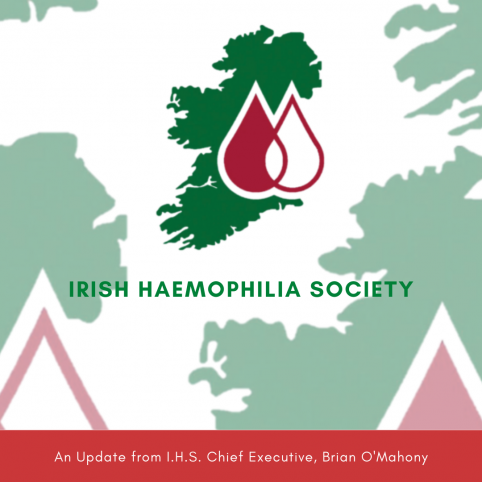For Covid-19 and haemophilia, all of the precautions with which we are becoming very familiar to avoid infection apply. Prevention and treatment do not substantially differ because a person has haemophilia.
The World Federation of Hemophilia (WFH) task force on Covid-19 have today issued an information advisory on Covid-19 and Haemophilia. This advisory on specific risks of Covid-19 in those with bleeding disorders is targeted at doctors and health care workers. Here, I will summarise some of the advisory in a question and answer format.
Are people with haemophilia and inherited bleeding disorders at increased risk of acquiring SARS-CoV-2 (the virus) and COVID-19 (the disease)
No increased susceptibility to infection has been found in people with bleeding disorders who are not immunocompromised. SARS-CoV-2 is passed primarily through droplets in the air coming from infected persons. These droplets get into the upper respiratory tract where they establish an infection.
There is no information about whether persons with HIV are at increased risk of acquiring the infection. However, if infected with Covid-19, immunocompromised people are at much higher risk for severe disease. For HIV, that includes:
– People with a low CD4 T-cell count (e.g., <200)
– People not on antiretroviral HIV treatment
– If there are other underlying diseases associated with severe COVID-19
– Additional information is available from the Centre for Disease Control in the USA: read here.
What are the risks if you have COVID-19 infection and a bleeding disorder?
– This infection causes a spectrum of disease, from asymptomatic to severe pneumonia and death is some severe cases. While older individuals and those with identified risk factors are at greater risk of serious and lethal disease, children and young adults may also develop severe disease, although less frequently.
– Risk factors include other diseases including hypertension, diabetes, cardiovascular disease, and immunosuppression.
Individuals with hypertension should not discontinue their medication. Current evidence does not support changes in the management of hypertension.
– As COVID-19 progresses, coagulation pathways are activated. This can in some cases lead to thrombosis. This can be checked by testing for increased levels in the blood of markers called D-Dimers.
– Close monitoring for bleeding and thrombosis is recommended for all individuals and treatment with anticoagulants can be used if there is evidence of thrombosis.
– If COVID-19 is diagnosed, prophylaxis with factor replacement therapy should be continued, and if hospitalized for severe infection, higher trough levels may need to be considered as if treating major trauma.
The risk of thrombotic complications for haemophilia patients who are currently treated with non-factor replacement therapies including emicizumab (Hemlibra) or therapies currently in clinical trials (e.g. Fitusiran, anti-TFPI) is unknown in the presence of COVID-19 infection.
Does haemophilia impact the treatment of Covid-19 infection?
– Patients with bleeding disorders of all severities and COVID-19 should be eligible for all available therapies that would be required depending on the severity of their condition (including ventilation support).
– Having haemophilia should not be a reason to withhold invasive management of COVID-19.
Adapted from advisory from the WFH COVID-19 Task Force:
Members: Dr. Assad Haffar, Dr. Barbara Konkle, Brian O’Mahony, David Page, Prof. Flora Peyvandi, Prof. Steve Pipe, Mark Skinner and Dr. Radek Kaczmarek and Dr. Glenn Pierce
